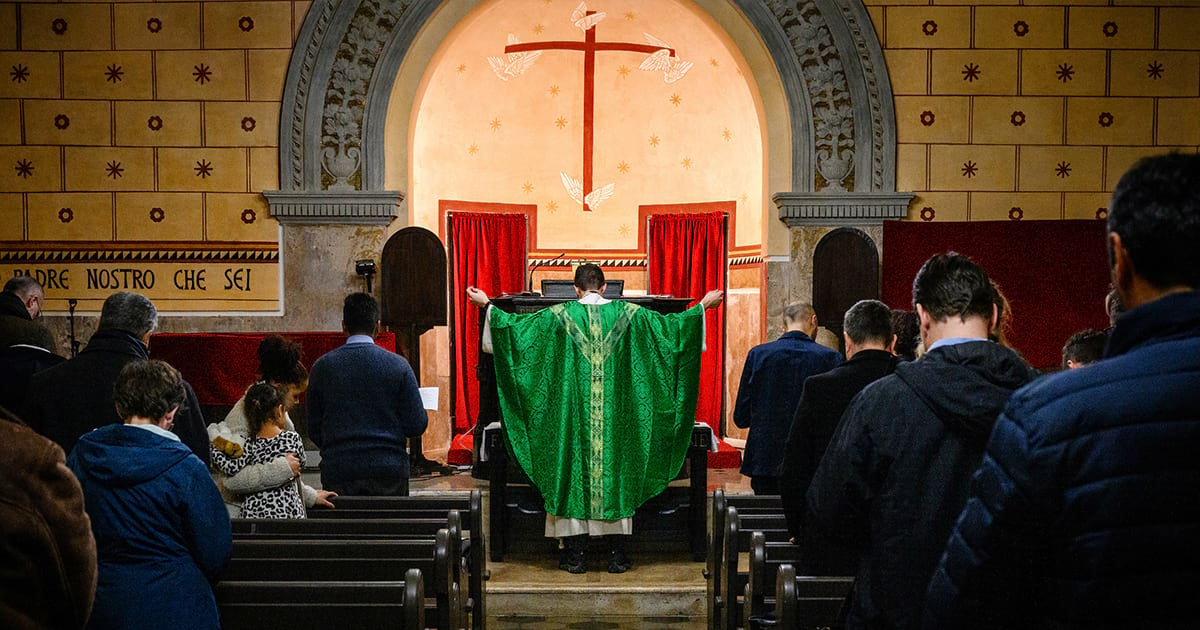
By Roy S. Askins
From Jan. 25 to 27 in Rome, Italy, the Confessional Lutheran Church of Italy — an LCMS Office of International Mission (OIM) church plant — hosted a conference on justification less than two miles from Vatican City. The conference concluded with the inaugural service of Christus Victor Lutheran Church.
The seeds of Lutheranism in Italy
While many factors played into the planting of a Lutheran church in the heart of Roman Catholicism, one of them began with an internet search. Lorenzo Murrone and Joshua Salas, both of whom are currently studying to become Lutheran pastors, had previously attended a number of churches throughout Rome but had struggled with the teachings of those church bodies.
“Josh and I attended an Anglican church for a while, but the church was … very progressive,” Murrone said, noting such issues as the affirming of homosexuality and women’s ordination. “After a bit of wandering, we eventually came across the confessional Lutheran church.”
Murrone and Salas found confessional Lutheranism through the social media channels of several LCMS pastors in the United States. They reached out to the OIM and were put in contact with the LCMS Eurasia region.
They soon started receiving catechesis in the Lutheran faith. Along with Luiz Roberto Lange, a Brazilian immigrant to Italy who had reached out to the LCMS in 2015, they are now studying for the pastoral ministry at the Luther Academy in Riga, Latvia.
‘A confessional opportunity’
As interest in Lutheran teaching has increased in Italy, the LCMS has sought to respond, including by calling the Rev. Tyler McMiller to serve as a missionary to the LCMS Eurasia region. McMiller recently finished catechizing a woman in southern Italy and is currently caring for Lutherans in Naples, Florence, Sicily, Torino, Milan and Padova. “Every single person that I’m in contact with has [first] contacted me,” McMiller said.
Meanwhile, in Rome, a small group of people initially began meeting in McMiller’s home. They now gather in the building of a Baptist congregation not 300 yards from the Pantheon. Key to their gathering as a community are settings of the Divine Service, Matins and Vespers, along with nearly 250 hymns, that have been translated into Italian. “Soon we’re going to have a small booklet … with 100 hymns,” Salas said. While it might be small, it’s a large step in the founding of the Confessional Lutheran Church of Italy.
On Jan. 27, in that building shared with a Baptist congregation, Christus Victor Lutheran Church held its inaugural service. Regarding the milestone, Murrone noted that the majority of people in Rome who consider themselves Roman Catholics do not go to church. Planting a church in Rome provides “a confessional, biblical and sacramental opportunity for people to approach Christ in a way that gives assurance of the forgiveness of their sins.”
Doctrine of justification
The conference that led up to the inaugural service reflects the heightened interest in theological study and discussion in Italy. “Europeans like to get together at conferences,” said the Rev. Dr. David Preus, a theological educator for the LCMS Eurasia region. “It’s their comfort zone. … [These conferences are] really how the conversation extends, [how] the church grows. And this leads to church planting.”
The doctrine of justification was intentionally chosen with the conference location in mind. It is one of the key differences between Lutheranism and Roman Catholicism, reflecting the truth that sinners are declared righteous by God for Christ’s sake through faith. Thus, especially for Lutherans, the doctrine of justification sits at the heart of the Christian faith. Preus noted in his conference presentation that while Roman Catholicism does have a doctrine of justification, it exists largely on the periphery of the Roman Catholic Church’s theological discussion.
During the conference, presenters examined the doctrine of justification in a variety of ways:
- Rev. Dr. David Preus, “Coming to Terms with the Doctrine of Justification: Lutherans versus Roman Catholics”;
- Rev. Sorin Trifa, “Ex Iniustis Justos Facere: Justification in the Apology of the Augsburg Confession”;
- Rev. Nathaniel Jensen, “A Summary of the Joint Declaration on the Doctrine of Justification”;
- Rev. Tyler McMiller, “The ‘Second Martin’s’ Examination of the Sixth Session of the Council of Trent”;
- Rev. Dr. Jules Gomes, “‘The Just Shall Live by Faith’: Did the Apostle Paul Betray the Prophet Habakkuk?”; and
- Lorenzo Murrone, “Justification: Dealing with Post-Baptismal Sins in Church History.”
Gomes, an Old Testament scholar who works as a journalist in Rome, regularly attends such conferences. “I must say,” he noted, “that this has been the best conference I’ve attended for the last four years in Rome.”
The LCMS Eurasia team is making plans to hold up to five conferences per year in the region.
Posted March 5, 2024